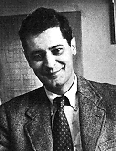| Profile | Major Works | Resources |
Robert E. Lucas, Jr., 1937-


One of the most influential modern economic theorists, Robert Lucas is the leader of the New Classical school - the "modern" version of the Chicago School. His introduction of the concept of "rational expectations" in the 1970s helped to decisively bury the Neo-Keynesian orthodoxy and inaugurated a new era of macroeconomics relying on the Neoclassical concept of supply-determined equilibrium, best exemplified in modern "Real Business Cycle" theory. He also made seminal contributions to the theory of investment (with "marginal adjustment costs", 1967), theory of endogenous growth (with "human capital", 1988), theory of asset pricing and the theory of money (with "cash-in-advance"). He is also renowned for the "Lucas Critique" (1976) of the use of econometric models for policy purposes. A professor at Chicago, Lucas won the Nobel prize in 1995.
|
Major Works of Robert Lucas
|
HET
|
|
Resources on Robert E. Lucas
|
All rights reserved, Gonšalo L. Fonseca
